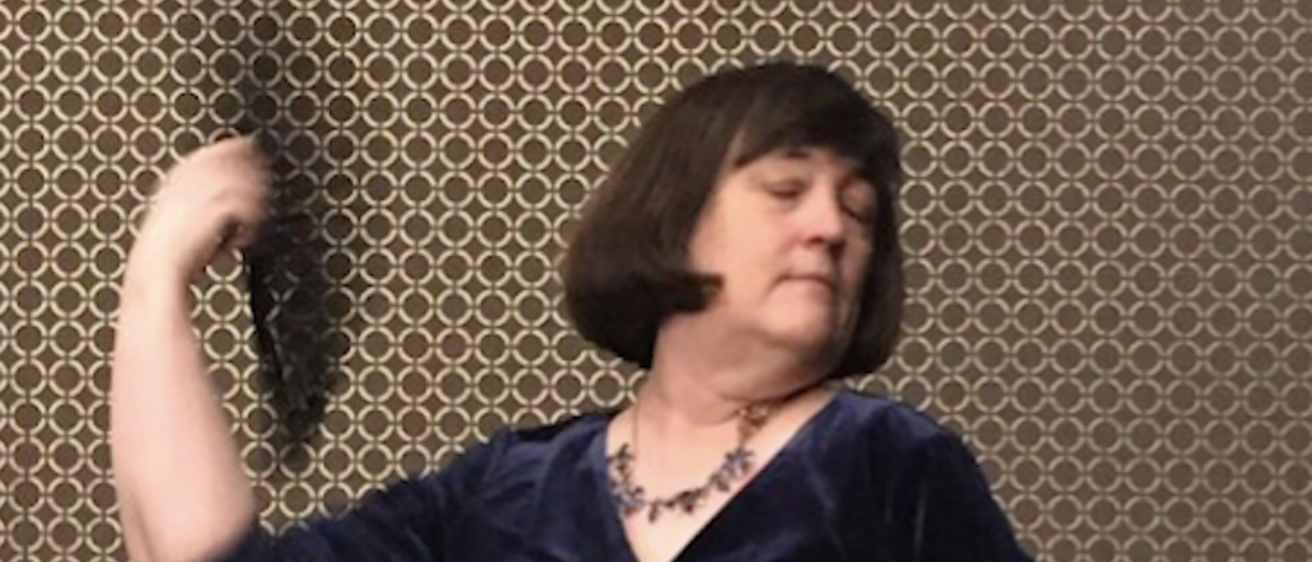On Sunday, October 24, Dr. Marian Wilson Kimber gave a recital in the Stark Opera Studio titled In a Woman’s Voice: Musical Readings by Women Composers.
She was accompanied by her musical partner, Dr. Natalie Landowski, a University of Iowa DMA Piano alum and Western Illinois University instructor of piano.

Together, the duo, known as Red Vespa, performs “musical readings,” a form of spoken word performance that gained popularity with American women in the late-nineteenth and early-twentieth centuries. Most often, these musical recitations were written and performed by women for women. In this recital, Red Vespa performed works by Frieda Peycke (1884-1964), Phyllis Fergus (1887-1964), Lalla Ryckoff (b. 1891), Nettie Arthur Brown (1864-1914), and premiered pieces by another University of Iowa alum, Lisa Neher.
I was able to talk with Dr. Wilson Kimber a bit about her recital; here’s what she had to say.
Anastasia: Your group is called Red Vespa. Where did the name come from, and can you give some background on the group?
Dr. Wilson Kimber: Natalie was a student in some of my classes while doing her DMA here at Iowa, and I was on her dissertation committee. I asked her to be part of this project when I was working as a fellow at the Obermann Center for Advanced Studies. We started in 2017 and had our first performance here in Musicology Colloquium, as an experiment. We went on to perform for the National League of American Pen Women at their meetings in Washington, DC and in Des Moines, for a Society of American Music meeting and an American Musicological Society meeting, and at Ohio State University.
As for the name, Vespas are little and sporty, and the pieces we perform are also short and sporty. Vespa also means wasp in Italian, and the pieces have some sting to them!
A: When was the last time you performed before COVID?
MWK: For a class at Western Illinois University, where Natalie teaches, in February 2020. We were scheduled to perform at a big women in music conference at Ball State University, but this got cancelled right as COVID was beginning.
A: What do you perform? Do the pieces change every concert?
MWK: Since we’ve mostly been seeing different audiences for each performance, we do a lot of the same pieces. But we’ve experimented with converting short songs by Carrie Jacobs-Bond into recitations, and for this concert, we premiered some pieces that we commissioned. (The pieces by Lisa Neher.) We program our pieces in groups by related topics, because that is what composers Phyllis Fergus and Frieda Peycke used to do on their programs in the 1920s and 1930s.
A: Can you tell me a bit about performance practice issues and practicing?
MWK: The voice part of the pieces is un-notated (when it comes to rhythm and pitch.) When you first see the text laid out on the page with the piano accompaniment, sometimes it looks like it should be heard right with the piano. But often, you have to recite around chords, especially at the ends of pieces. Natalie and I do a lot of practicing endings; each piece tends to end with a punchline, so I deliver the ending punchline, and Natalie waits to play the final chords after that. Otherwise, it would get drowned out. There’s also a lot of practicing pacing and timing.
A: What was your favorite part about being able to perform these pieces, especially because it’s been a while?
MWK: Hearing people laugh. Also, there’s something that happens when you perform these pieces for a live audience instead of just in a practice session. It’s fun to see how each audience reacts differently to the pieces. These works were originally written by women for women, so when we take these pieces to women’s groups, they love them. Musical readings, with their punchlines, are an art form that’s meant to communicate with the audience.
Dr. Wilson Kimber also mentioned that in the writing of these comical works, humor was a form of power for women. They were pushing back against established social norms and constructions for women, with humor, in a less threatening way.
